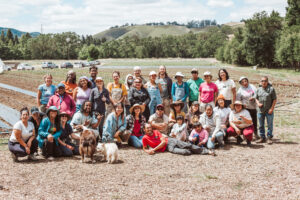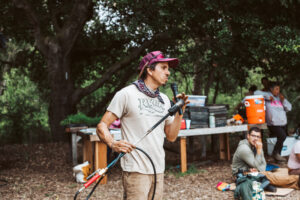Progress report for FW23-417
Project Information
The title of our project is a reference to Leah Penniman’s “Farming While Black: Soul Fire Farm’s Practice Guide to Liberation on the Land” (2018) written by a Black farmer in New York. Our project draws inspiration from this work to document and share our experiences as beginning farmers of color in California’s highly competitive agricultural landscape. Beginning farmers are a critical demographic in the U.S., as census data illustrates that the U.S. farmer population is both aging and shrinking, indicating the importance of young and new-entry farmers (USDA NASS 2017). Unfortunately, beginning farmers face a suite of challenges in developing sustainable farming operations, especially accessing land and start-up capital (Ahearn 2011; Calo 2018). Beginning farmers of color face additional challenges in developing their farm businesses, as they face both explicit and implicit racism in farming programs. Given the challenges that beginning farmers of color face in developing sustainable agricultural operations, it is important that these farmers understand strategies for accessing support. Our project aims to share strategies for accessing such support through a tightly-coupled approach to research and education.
Our proposed research consists of a case study supported by qualitative analysis of participant observation data gathered from our day-to-day experiences as beginning, small-scale farmers of color. Findings will provide information about strategies for overcoming obstacles farcing beginning farmers of color. Following bi-weekly data analysis and identification of emergent themes, we will develop and upload monthly videos to YouTube, social media, and our website to share our most recent findings over the course of a 12-month period, for a total of 12 videos. We will also share major findings of our study through a field day at our farm in Morgan Hill, CA, and through a presentation at the annual EcoFarm conference in Pacific Grove, CA.
Research Objective 1: Conduct participant observation and collect ethnographic field notes daily to record the challenges we experience as we develop our farming operation.
Research Objective 2: Conduct bi-weekly analysis of field notes to identify emergent themes.
Educational Objective 1: Produce monthly YouTube videos and a website to host videos and additional resources.
Educational Objective 2: Conduct an in-person farmer field day at our farm in Morgan Hill, CA.
Educational Objective 3: Present our findings at the Ecological Farming Association’s annual conference in Pacific Grove, CA.
| Date | Activity | Team members |
| April 2023 |
Create website to host videos and additional resources |
PIs (Dilip Sharma, Hector Calderon-Victoria) |
| May 2023 - Sep 2024 |
Daily: Conduct participant observation and collect ethnographic field notes Bi-weekly: Conduct bi-weekly analysis of field notes to identify emergent themes Monthly: Produce monthly YouTube videos and update website |
PIs (Dilip Sharma, Hector Calderon-Victoria), TA (Aysha Peterson) will guide qualitative coding processes |
| Sep 2024 | Complete annual reporting | PIs (Dilip Sharma, Hector Calderon-Victoria) |
| Summer 2024 | Host farmer field day at farm in Morgan Hill, CA | PIs (Dilip Sharma, Hector Calderon-Victoria), TA (Aysha Peterson) will support with facilitation |
| Dec 2024 – Jan 2025 | Prepare for and host EcoFarm conference presentation | PIs (Dilip Sharma, Hector Calderon-Victoria), TA (Aysha Peterson) will support with facilitation |
| April 2025 | Complete final reporting | PIs (Dilip Sharma, Hector Calderon-Victoria) |
Cooperators
- - Producer
- - Technical Advisor
- - Producer
Research
Our research consists of a case study supported by qualitative analysis of participant observation data gathered from our day-to-day experiences as beginning, small-scale farmers of color. Rather than prioritizing generalizability of results – as is typical of much quantitative scientific research – a qualitative case study employs context-dependent knowledge to develop theory (Flyvbjerg 2006). This approach is commonly utilized in the social sciences to offer fine-grained analyses of a phenomenon and we model our approach after SARE project LNC90-028. In our case, we utilize the case study approach to offer detailed insight into the challenges experienced by beginning farmers of color, as well as into the strategies utilized to overcome these challenges. With this approach, we aim to produce a case study of the challenges we experience that is directly accessible to other farmers. Our method follows what some scholars refer to as the “farmer-to-farmer” approach, in which farmers share their insights directly with their peers (Holt-Gimenez 2006). We expect this case study to document administrative activities (e.g., how we chose an online bank that did not charge a monthly fee, how we went about registering a company, how we wrote our business operation and planning document, what forms we filed with FSA and NRCS) as well as field activities (e.g., how we disked the land, how we conducted and interpreted soil and water tests, how we applied compost and cover crops).
Research Objective 1: Conduct participant observation and collect ethnographic field notes daily to record the challenges we experience as we develop our farming operation.
Social scientists have long utilized “participant observation” as a data collection method in which the researchers observe the subject of research by participating directly in the action (Spradley 2016). In our case, we are interested in the experiences of beginning farmers of color – especially those working at a small-scale – as we/they struggle to develop a sustainable agricultural operation. Although scholars have conducted some research on this subject, often utilizing interviews with farmers, we intend to explore the struggles of beginning farmers of color by documenting our own experiences through participant observation. With this method, we observed and recorded our experiences daily using “ethnographic field notes.” Following Chiseri-Strater and Sunstein (1997), all field notes included not only facts about what happened, but also sensory impressions, personal responses and reflections, and questions for future investigation. Notes were recorded by each farmer on every day that farm-related work took place in a field journal.
Research Objective 2: Conduct bi-weekly analysis of field notes to identify emergent themes.
There are multiple strategies utilized in the social sciences to qualitatively analyze ethnographic field notes. For our project, we used an inductive approach to data analysis which allows for open-ended analysis. This approach differs from other qualitative analysis techniques in which the researcher codes for pre-determined themes. First, we read through our field notes and highlighted different processes. These processes were then grouped into categories, and finally into even broader themes (e.g. “acquiring field equipment” or “accessing capital”) (Saldaña 2021). This process took place bi-weekly in preparation for development of videos and blog posts (see “Educational Plan”).
Research outcomes
During the 2023 and 2024 seasons, we observed and recorded our daily experiences using ethnographic field notes. Throughout the seasons, we conducted structured reflections on our field notes every other week and have now identified emergent themes. Findings indicate that greater research and extension on the following topics would be beneficial for beginning farmers of color: (1) establishing strategic business partnerships; (2) initial farm site preparation; (3) acquiring field equipment; (4) accessing water and irrigation infrastructure; (5) accessing start-up capital; (6) identifying and collaborating with local farm assistance organizations; (7) building soil health; (8) managing weeds; (9) making a crop plan; (10) accessing markets; (11) navigating relationships with neighbors; (12) discerning useful information online.
Education and Outreach
Participation summary:
Our case study employs a tightly-coupled approach to research and education that aims to both document challenges facing beginning farmers of color and share strategies for overcoming these challenges with a wide online audience. The aim of our research has been to document every step of our own personal experiences. We hope the case study that we produce can serve as a reference for aspiring farmers and organizations that help support them. Accordingly, we intend to share our case study widely through both online and in-person educational activities.
Educational Objective 1: Produce monthly YouTube videos and a website to host videos and additional resources
Now that we have completed data analysis and identification of emergent themes, we will develop and upload 12 videos to YouTube to share our findings. Videos will take the form of personal reflections and conversations between us (Dilip and Hektor) and our technical assistance provider (Aysha), in which we discuss our findings and will include shots of our farming activities whenever relevant. We are planning to complete this work throughout the remainder of 2025. Ultimately we expect that, by making these videos public, we will help not only farmers but also farmer assistance providers who seek to work with beginning farmers of color.
Educational Objective 2: Conduct an in-person farmer field day at our farm in Morgan Hill, CA
On May 25, 2024, we organized and hosted an in-person farmer field day at our farm (see photos below). The purpose of this field day was to share our preliminary research findings with other beginning farmers of color and with regional technical assistance providers, as well as to provide a networking space where beginning farmers of color could meet each other and learn about various resources available to them. To do so, we partnered with Agroecology Commons, a collective of farmers and land managers in the Bay Area. Agroecology Commons helped to conduct outreach for the field day and facilitate day-of events. We began with a presentation followed by a discussion about the challenges that we and others experience in developing our farms. Additionally, Agroecology Commons coordinated multiple skillshares to address some of our preliminary findings, including “Seeking assistance from local farm assistance organizations” (#6), “Building soil health” (#7), and “Determining crop profitability and making a crop plan” (#10).
Educational Objective 3: Present our findings at the Ecological Farming Association’s annual conference in Pacific Grove, CA
The Ecological Farming Association’s annual conference (EcoFarm) is a regional networking and educational hub for farmers, researchers, educators, and others working towards sustainable agricultural systems. We will share our research findings at the conference in January 2026, drawing on our repository of videos to provide engaging presentation materials. We will also leave plenty of time for discussion so that beginning farmers of color and others in the audience can discuss our journey with us and share from their own experiences.
We successfully held a Farmer Field Day on May 25, 2024 (Objective 2). We had 32 farmers and 3 technical assistance providers in attendance, which exceeded our goal of 20 attendees. Given that not all attendees were comfortable with reading and writing, we administered the WSARE survey verbally at the end of the event, giving us an opportunity to discuss responses. Everyone in attendance agreed that this event improved their awareness of the topics covered, provided new knowledge, provided new skills, and modified their opinions or attitudes. Everyone in attendance said that they would adopt one of more of the practices shown, to increase their operation’s diversifications, reduce their use of purchased off-farm inputs, increase their networking with other producers, and incorporate value-added into some aspect of their operation. Both producer and professional attendees were particularly interested in our process of seeking assistance from local farm assistance organizations. In response, we shared more about our challenges and successes related to seeking assistance from local farm assistance organizations and recommended that farmers build a relationship with one trusted technical assistance provider who could provide in-depth insight about which individuals, organizations, and programs might be supportive to them. The 3 professionals in attendance also indicated that they were looking forward to seeing our videos so that they could use them in trainings with farmers.
Education and Outreach Outcomes
Seeking assistance from local farm assistance organizations
Building soil health
Determining crop profitability and making a crop plan

